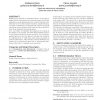Free Online Productivity Tools
i2Speak
i2Symbol
i2OCR
iTex2Img
iWeb2Print
iWeb2Shot
i2Type
iPdf2Split
iPdf2Merge
i2Bopomofo
i2Arabic
i2Style
i2Image
i2PDF
iLatex2Rtf
Sci2ools
124
click to vote
ACMACE
2005
ACM
2005
ACM
Motivation-driven educational game design: applying best practices to music education
Building upon research on motivation theory, we provide insights on how video games can be framed as expert tools that naturally reconcile learning and fun, a worthy goal since students are forced to where players volunteer, namely learning. Our main contribution is to suggest best practices rooted in psychology and motivation theory that we believe should be used when designing educational games. As a case study, we illustrate this approach by looking at the design of our ongoing Cha-Luva Swing Festival project, a video game dedicated to music education. Its overall pedagogical goal is to spur the players’ curiosity and creativity by enabling them to easily play music using gamepads as musical instruments. This example perfectly illustrates our results, since motivational lapses due to instrumental limitations often lead to resignation and surrender. Categories and Subject Descriptors K.3.1 [Computers and Education]: Computer Uses in Education; J.5 [Arts and Humanities]: Performing...
Related Content
| Added | 25 Jun 2010 |
| Updated | 25 Jun 2010 |
| Type | Conference |
| Year | 2005 |
| Where | ACMACE |
| Authors | Guillaume Denis, Pierre Jouvelot |
Comments (0)

